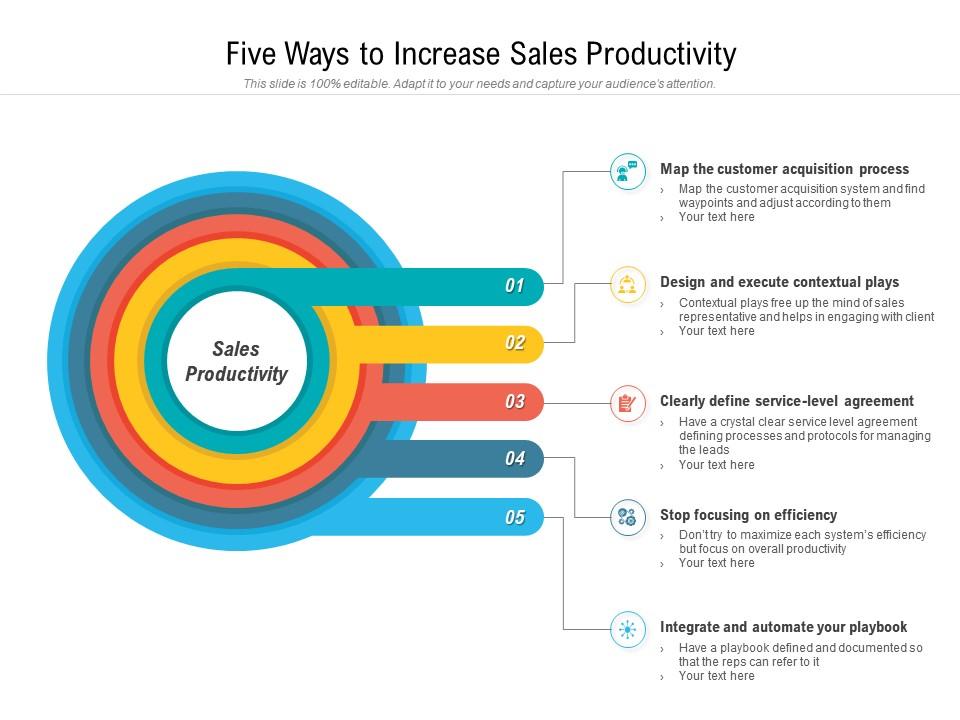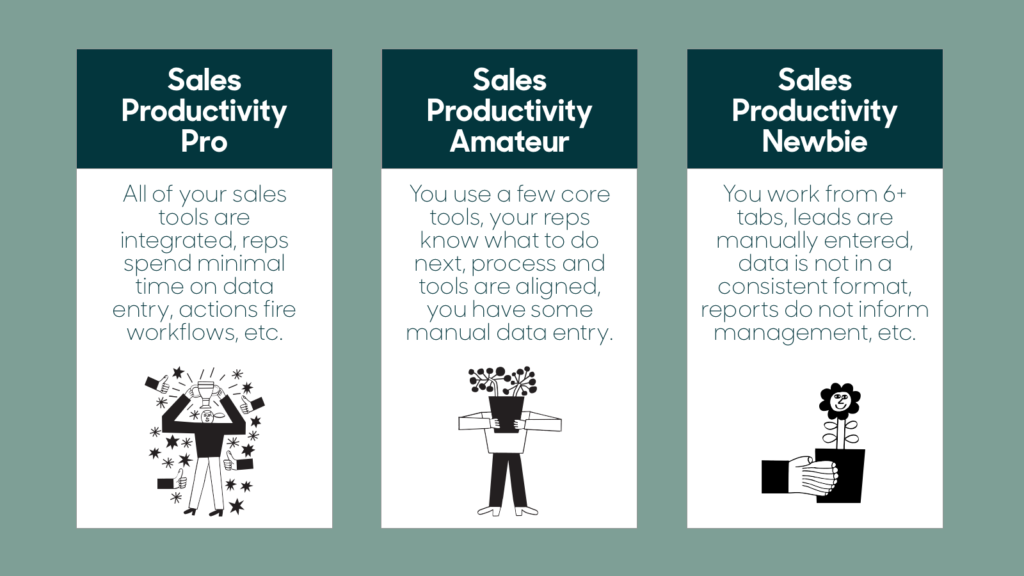Sales teams constantly strive to close more deals faster. High productivity is key to achieving this goal.
Every sales professional knows the importance of efficiency and effectiveness in their daily routine. Boosting sales productivity isn’t just about working harder; it’s about working smarter. This involves optimizing processes, employing the right tools, and adopting strategies that lead to better time management and more closed deals.
In this post, we’ll discuss practical steps to help sales teams become more productive. From refining your sales pitch to leveraging technology, we’ll explore methods to streamline your workflow and increase your output. Whether you’re a seasoned salesperson or new to the field, these tips will help you sell more in less time. So, let’s dive in and learn how to boost your sales productivity and take your performance to the next level.
Table of Contents
Introduction To Sales Productivity
Sales productivity is the rate at which a sales team converts leads into revenue. It’s a direct reflection of a team’s effectiveness and efficiency. Understanding and enhancing sales productivity can lead to better performance and higher profits.
Why Sales Productivity Matters
Improved sales productivity means more sales with less work. It allows businesses to grow and compete in today’s fast-paced market. Teams that focus on productivity can serve more customers and close deals faster.
Key Challenges In Sales
- Time management
- Lead quality
- Access to the right tools
- Effective sales strategies
Teams face these challenges daily. Overcoming them is key to boosting productivity.

Credit: www.slideteam.net
Leveraging Technology
Leveraging technology is key to boosting sales productivity. It helps sales teams work smarter, not harder. Tools like CRM systems and automation can make a big difference. Let’s explore how.
Crm Systems
CRM stands for Customer Relationship Management. These systems keep track of all customer info. This means less time searching for details and more time selling. Sales teams can see everything in one place. Contacts, emails, sales history, and more. Easy access to information leads to better customer conversations. And better conversations can lead to more sales.
Automation Tools
Automation tools take over repetitive tasks. Think of sending emails or updating records. These tasks can eat up a lot of time. With automation, sales teams can focus on selling. Tools can send follow-up emails on their own. They can also remind salespeople of important tasks. This helps in making sure no opportunity is missed. Automation supports sales teams to be more efficient. And efficiency can drive sales numbers up.
Enhancing Sales Training
Enhancing sales training boosts productivity. It equips teams with skills to close deals faster. Smart training strategies lead to better performance. Let’s explore effective training tactics.
Regular Workshops
Workshops keep sales teams sharp. These sessions introduce new techniques. Sales reps get to refresh their knowledge. Make workshops engaging and frequent. This ensures teams stay updated on best practices. It helps them tackle real-world selling challenges.
Role-playing Scenarios
Practice makes perfect. Role-playing mimics actual sales situations. Reps practice their pitches. They learn how to handle objections. Feedback from these sessions is priceless. It helps reps improve their approach. They become more confident in their sales conversations.
Data-driven Decision Making
Data-driven decision making is key to sales success. It turns raw data into actionable insights. Sales teams can focus on the right leads and strategies. This approach boosts productivity and drives revenue.
Metrics And Kpis
Sales metrics and KPIs guide teams. They show what’s working and what’s not. By tracking the right data, sales teams can improve their tactics. They can set realistic goals and achieve them.
Sales Analytics Platforms
Modern sales analytics platforms are powerful. They provide real-time data to sales teams. With this info, teams can respond quickly to market changes. This agility is critical for staying ahead in competitive markets.
Optimizing Sales Processes
Optimizing Sales Processes is key to better sales results. It makes teams work smarter, not harder. By making a few smart changes, sales teams can do more in less time. Let’s look at how to make sales processes better.
Streamlining Workflow
To improve sales, start with the workflow. A smooth workflow means tasks move quickly from one step to the next. Here are ways to make workflows better:
- Use tools that save time. For example, CRM software helps keep customer info in one place.
- Set clear roles for team members. Everyone should know their tasks.
- Automate routine tasks. Use software to handle emails and updates.
Eliminating Bottlenecks
Bottlenecks slow down sales. They are steps where work stops or slows down a lot. To fix bottlenecks:
- Find where bottlenecks happen. Look at the whole sales process.
- Talk to the team. They can tell you where problems are.
- Make changes to improve. This might mean training or new tools.
Fostering A Productive Sales Culture
Fostering a productive sales culture is key to boosting performance. It motivates teams and sharpens focus. By nurturing the right atmosphere, companies can see a significant rise in sales productivity. Let’s explore how to cultivate such an environment.
Incentive Programs
Effective incentive programs drive motivation. They reward top performers and inspire the whole team. These programs should be clear, achievable, and closely tied to key performance indicators.
- Monthly sales contests
- Annual bonuses for targets met
- Recognition awards for customer service
Collaborative Environment
Creating a collaborative environment is critical. It encourages sharing of best practices and knowledge. Teamwork leads to better problem-solving and innovation.
| Activity | Benefit |
|---|---|
| Regular team meetings | Enhances communication |
| Shared goals | Aligns individual and team efforts |
| Peer mentoring | Boosts learning and growth |
Customer Relationship Management
Customer Relationship Management (CRM) tools empower businesses to track client interactions. These systems streamline sales processes, leading to increased productivity. Effective CRM implementation can result in more sales with less effort.
In the competitive realm of sales, Customer Relationship Management (CRM) stands as a vital tool. It bridges the gap between businesses and clients. This tool captures customer interactions, turning data into actionable insights. Let’s delve into how CRM can boost sales productivity.Personalized Engagement
CRM helps to know each customer well. This knowledge allows for tailored conversations. Personalized messages make clients feel special. They see offers that fit their needs. This strategy often leads to more sales. CRM tracks preferences, past purchases, and interactions. Using this data, sales teams can craft offers that resonate. The result? Better customer experiences and repeat business.After-sales Support
The sale is just the beginning of the customer journey. After-sales support is key to customer satisfaction. CRM systems log service issues and follow-ups. They ensure nothing falls through the cracks. Quick, helpful service keeps customers coming back. Happy customers tell friends, which can mean new leads. CRM makes managing these tasks easier. It helps the sales team focus on selling, not just service.
Credit: blog.idonethis.com
Continuous Improvement
Continuous improvement strategies enhance sales productivity by streamlining processes and reducing waste. Implementing these methods can lead to consistent gains in sales effectiveness and customer satisfaction.
Improving sales productivity is crucial. Teams grow by learning and changing. Think of it as a journey, not a destination. Continuous improvement helps. It involves small, steady changes. These changes lead to big results over time.
Feedback Loops
Feedback is key. It tells us what works and what doesn’t. Encourage teams to share insights. This helps everyone learn. Use customer feedback too. It guides improvements. Regular team meetings can share feedback. This makes the whole team better.
Adaptability To Market Changes
Markets change fast. Sales teams must adapt quickly. Understanding new trends is important. It helps teams stay ahead. Adaptability keeps your sales efforts relevant. Teams that adjust, succeed. They meet customer needs better. This leads to more sales.

Credit: www.prialto.com
Frequently Asked Questions
What Are Effective Strategies For Boosting Sales Productivity?
Effective strategies include streamlining processes, using CRM tools, training sales teams, and setting clear goals.
How Can Technology Impact Sales Team Efficiency?
Technology, like automation and CRM, saves time and organizes data, leading to more efficient sales efforts.
What Role Does Training Play In Sales Success?
Regular training updates skills and knowledge, helping salespeople close deals more effectively.
Can Better Goal Setting Improve Sales Outcomes?
Yes, clear and achievable goals guide sales teams towards higher performance and productivity.
How Does Time Management Influence Sales Productivity?
Good time management ensures priority tasks are completed, increasing the chances of sales success.
What Are The Benefits Of Using Crm For Sales?
CRM helps track customer interactions, manage leads, and analyze data to improve sales strategies.
How Can Sales Teams Stay Motivated To Achieve Targets?
Teams stay motivated with incentives, recognition, and a positive work culture that celebrates success.
What Are Common Mistakes To Avoid In Sales?
Avoid neglecting customer needs, skipping follow-ups, and being unprepared for customer interactions.
Conclusion
Boosting sales productivity is crucial for business growth. Simple strategies make a big difference. Set clear goals and provide the right tools. Effective training empowers teams. Regular feedback helps too. Remember, small steps lead to big wins. Keep your team motivated and focused.
Together, you’ll see sales climb. Embrace these tips and watch your business thrive. Success is within reach. Let’s get those sales numbers up!









